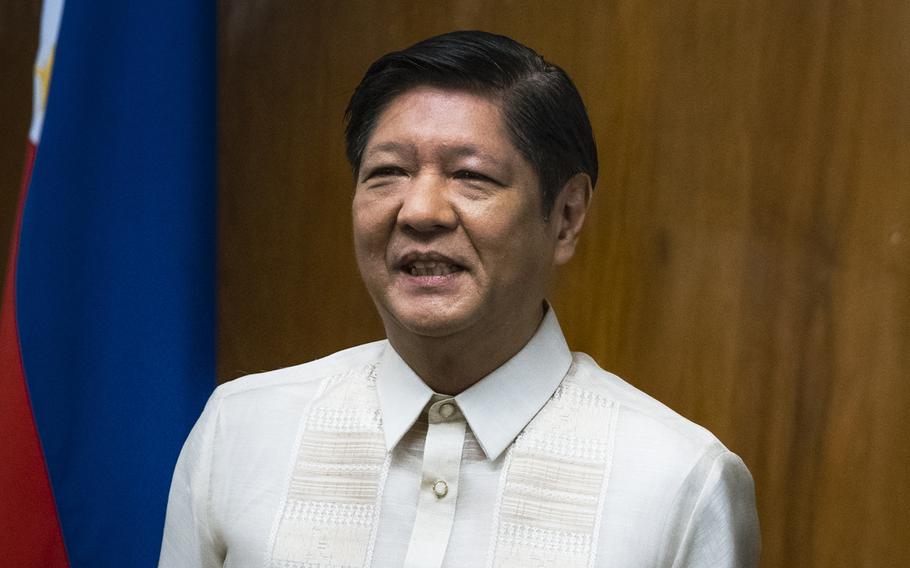
Philippine President Ferdinand Marcos Jr. poses in Manila, Feb. 2, 2023. (Chad McNeeley/Department of Defense)
Philippine President Ferdinand Marcos Jr. says he’d consider a reciprocal military access agreement with Japan to guard his country’s fishermen and sea territory amid tension with China.
“If it will be of help to the Philippines in terms of protecting, for example, our fishermen, protecting our maritime territory, if it’s going to help, then … I don’t see why we should not adopt it,” Marcos said, according to an official transcript of an interview with reporters on his flight back Sunday from a five-day official trip to Tokyo.
Philippine officials are assessing whether such an agreement would help their country or worsen tensions in the South China Sea, Marcos said.
"We have to be careful also because we do not want to appear provocative,” he said. “That instead of calming the situation in the South China Sea, we would heighten it, right? That's not what we want.”
Japanese Prime Minister Fumio Kishida “briefly” discussed the concept of a defense pact when the two leaders met on Thursday, Marcos said. That day, the pair signed an agreement that allows Japan to deploy its forces for humanitarian missions and disaster response in the Philippines, The Associated Press reported Friday.
Marcos’ comments came 10 days after the United States and the Philippines announced that U.S. forces will gain access to four more bases in the islands. The allies previously agreed that American troops could access five Philippine installations under the Enhanced Defense Cooperation Agreement.
Defense cooperation is coalescing amid tension with Beijing in the South China Sea, where China has territorial disputes with many of its neighbors, including the Philippines.
The Philippine coast guard, in a statement Monday, said a Chinese coast guard vessel on Feb. 6 twice hit a Philippine coast guard vessel in the South China Sea with a "military-grade laser light," temporarily blinding crew members.
The Chinese ship maneuvered dangerously to block the Philippines’ BRP Malapascua patrol ship from approaching the Philippine-occupied Second Thomas Shoal in the Spratly Islands, according to the statement.
Japan, which occupied the Philippines during World War II, has sent troops there in recent years to participate in training with U.S. and Philippine forces.
Tokyo has promised to develop infrastructure to help Japanese military deployments to the Philippines, according to Jeff Kingston, a professor of history and Asian studies at Temple University, Japan Campus.
“Both nations see a growing threat from China in disputed territories and waters and the [Philippines] is eager to upgrade its weak military capacity while [Japan] seeks to participate in and shape the emerging regional security architecture,” he said in an email Monday.
Marcos’ comments will be welcome in Washington, where greater cooperation between its allies and security partners is seen as key to containing China, Kingston said.
However, Marcos, like his predecessor, Rodrigo Duterte, seems hesitant to provoke Beijing, he said.
China has recently pledged $24 billion of investment in the Philippines against $5 billion from Japan, although Tokyo is a more welcome partner, Kingston said.
Experts weigh in
Reciprocal access agreements allow Tokyo to engage with security partners beyond the core U.S.-Japan alliance, according to James Brown, an international affairs expert at Temple University, Japan.
Japan has already announced such agreements with Australia and the United Kingdom, Brown said in an email Monday.
“With the South China Sea being a key focus for Japan's security, [a reciprocal access agreement] with a southeast Asian country is an obvious next step,” he said.
Marcos may hope that an agreement with Japan won’t raise tensions, but Beijing is not likely to see it this way, Brown said.
“China can therefore be expected to apply pressure on the Philippines to prevent this agreement from ever seeing the light of day,” he said.
In a Taiwan crisis, having the Philippines supportive of the U.S. and Japan and allowing military access is a huge advantage, according to retired Marine Col. Grant Newsham, a senior researcher with the Japan Forum for Strategic Studies in Tokyo.
U.S.-Philippine and U.S.-Japan-Philippine maritime patrols would be a good idea, Newsham said in an email Monday.
“Beijing will howl, but if these aren't done the Chinese will gradually establish its control over Philippine maritime territory,” he said.
Marcos’ comments are consistent with the trajectory of security policy in Manila and Tokyo, according to Brad Glosserman, deputy director and visiting professor at the Center for Rule-Making Strategies at Tama University in Tokyo.
“The question is how long Marcos will stay the course,” he said in an email Monday. “China is going to put him under substantial pressure. Will he stand up?”